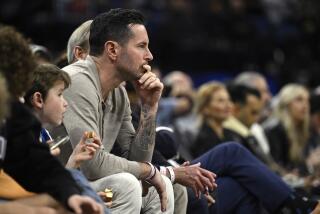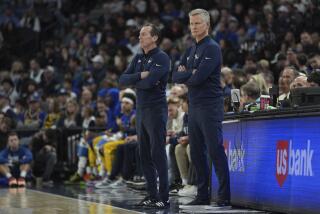OF TWO MINDS
- Share via
JACKSONVILLE, Fla. — Andy Reid sunk his large frame into a comfortable position, closed his eyes and waited. He had been waiting for years to become a head coach.
Now he was going to have to wait a little longer.
It was a wintry night in 1999. Reid, hired as coach of the Philadelphia Eagles, was attempting to report for work from Green Bay, where he had been an assistant coach. But, because of bad weather, his flight had been diverted to Baltimore.
Reid’s best option from there was to take a train to Philadelphia. But there were no trains until morning, so he spent the night sleeping at a Baltimore train station.
When he finally got to Philadelphia the next day, there were introductions to be made, offices to be arranged, and assistant coaches to consider, along with the countless small details that go with starting a new football regime.
It was late evening when an exhausted Reid started out in search of a meal, along with Butch Buchanico, a team official.
As they finally sat down in a South Philadelphia restaurant, in walked a priest. Recognizing the Eagles’ newest hire, he offered Reid his blessings.
As the priest moved on, he was stopped by a large group at a nearby table and asked why he had bestowed his prayers on the large gentleman with the big, bushy mustache.
Informed that man was the new coach of the Eagles, they booed in Reid’s direction.
“You ain’t been in this town 12 hours,” Buchanico said, smiling, “and you’ve already been blessed and booed.”
Welcome to Philadelphia, where the brotherly love is parceled out only to the winners, and cynicism, developed through years of losing in all the major sports, is the prevailing attitude.
Losing was what the Eagles did best. That January night, Reid was taking over a team that had finished 3-13 the season before.
Reid had seen the other side in Green Bay, where he had been in two Super Bowls and earned a championship ring in Super Bowl XXXI, a 35-21 Packer victory over the New England Patriots.
When Reid stands on the sideline Sunday to again face the Patriots, this time as a head coach in Super Bowl XXXIX, he will be wearing that ring on his right hand, a glistening reminder that the pinnacle of his coaching career lies before him.
*
Sports were a passion for Reid growing up in Los Angeles, baseball even more than football. He could usually be found at Dodger Stadium, the Coliseum -- where his favorite players were Ram linemen Deacon Jones and Merlin Olsen -- or at Tommy’s hamburger stand.
Reid was droning on and on this week about offensive formations, special teams and various other mundane football topics. But when an offbeat question was tossed in about Tommy’s, Reid’s eyes lighted up.
As a teenager, did he gobble down most of his burgers there at 2 a.m.?
“When else,” Reid said with a smile, “would you eat at Tommy’s? The later you ate there, the better it tasted.”
Coaching was certainly not what Reid had in mind growing up. Attending John Marshall High and Glendale Community College, he thought about being a doctor. Or a sportswriter. Reid actually pursued the latter while at Brigham Young University.
“I loved [L.A. Times columnist] Jim Murray,” Reid said. “I wrote one of those cutesy deals, trying to write like Jim. The editors took it easy on me.”
It was after Reid realized he wasn’t going to be the next Murray that the idea of making coaching his profession first popped into his head. Actually, his BYU coach, Lavell Edwards, put it there.
After graduating from BYU, Reid joined the school’s football staff as a volunteer assistant. It was there that he formed a bond with BYU’s quarterbacks coach, Mike Holmgren, the man who would become his mentor.
Reid was soon traveling the country as a full-time college assistant, from San Francisco State to Northern Arizona to Texas El Paso to Missouri.
In 1992, he got a call from Holmgren, then coach of the Packers, to be his tight ends coach. Reid stayed seven years until Jeffrey Lurie came calling.
*
After watching his team stumble to 3-13, Lurie, owner of the Eagles, was determined not to round up the usual suspects when searching for a successor to coach Ray Rhodes.
“Just because a coaching candidate is not on the hot list doesn’t mean it’s not the way to go,” Lurie said. “It was unconventional when we hired Andy. He wasn’t a coordinator or former head coach.
“But what Andy has is intellectual capital. He has no ego. To him, it’s all about building team community. He’s genuine and people follow that. He’s comfortable with himself. He’s not paranoid, worried about what others think.”
That became obvious a few months after Reid arrived. Although the popular sentiment was to take running back Ricky Williams with the second pick in that spring’s draft, Reid opted for quarterback Donovan McNabb.
Again, the boos rained down on Reid. Being booed after losing games was nothing new for him. But he had now been booed twice before his team had even played a game.
Even though McNabb proved to be the right choice, Reid’s reign in Philadelphia started out slow. The Eagles went 5-11 in his first season, but then improved to 11-5 in his second year -- and went on to the NFC championship game in each of the next four seasons.
It hasn’t been easy. Philadelphia lost the first three of those NFC title games before taking the final step to the Super Bowl this season.
But through it all, Reid’s reputation for integrity and resolve has remained intact.
Offensive lineman Jon Runyan was sitting in a Philadelphia restaurant one night talking to Reid about signing with the Eagles. They were approached by one of the city’s most esteemed sports figures, Temple basketball Coach John Chaney.
“Don’t come here because of the city or the fans,” Chaney told Runyan, “come here because of Andy Reid.”
Runyan signed with the Eagles and soon learned what attracted players to the head coach -- a bend-don’t-break philosophy that extends well beyond Xs and O’s. He maintains high standards of conformity on the field but allows his players to be themselves off the field.
Of course, trying to quiet Terrell Owens or Freddie Mitchell might be tougher than trying to shut down Tom Brady and Corey Dillon.
But that doesn’t mean Reid puts up with outlandish behavior.
On one road trip, defensive lineman Hugh Douglas was in the back of a team bus, singing and carrying on, breaking the pregame mood.
As Reid got off the bus, he told an aide, “Make sure he never rides on my bus again.”
Douglas never has, always riding on another bus in the Eagles’ four-vehicle caravan.
Bless him or boo him, Reid usually gets his way.
More to Read
Go beyond the scoreboard
Get the latest on L.A.'s teams in the daily Sports Report newsletter.
You may occasionally receive promotional content from the Los Angeles Times.










